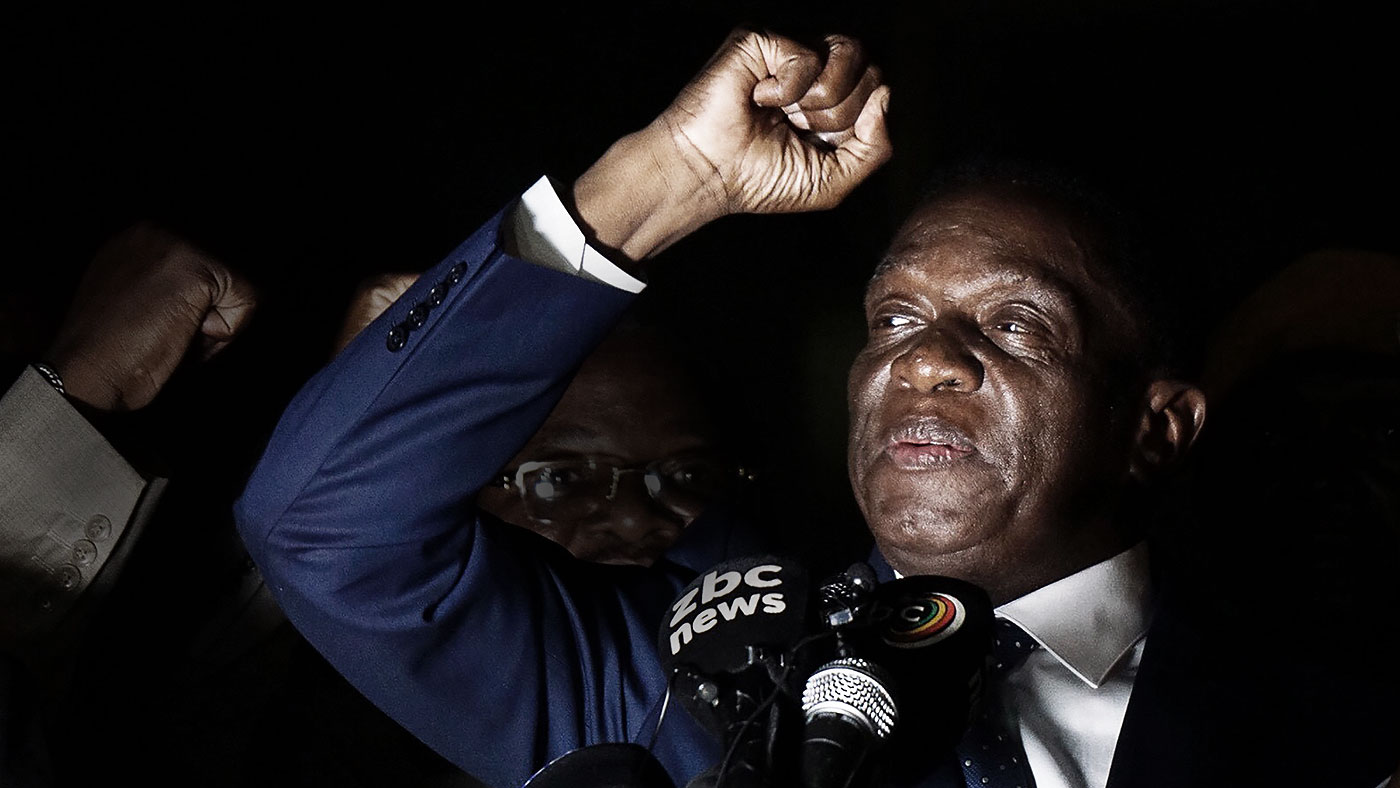Emmerson Mnangagwa: economic saviour or brutal boss?
The winner of the Zimbabwean presidential election has a chequered past

A free daily email with the biggest news stories of the day – and the best features from TheWeek.com
You are now subscribed
Your newsletter sign-up was successful
Emmerson Mnangagwa has been declared the winner of Zimbabwe’s presidential election, following days of chaos and deadly clashes.
Election observers are still “reserving judgement” of the election, says The New York Times, and it is “not yet clear whether this election would pass the test” and give Mnangagwa “legitimacy as a democratically chosen leader”.
Four days after the vote, it was announced yesterday that Mnangagwa had taken 50.8% of the vote, gaining a narrow majority that spared him a run-off. His closest rival, opposition leader Nelson Chamisa, finished on 44.3%.
The Week
Escape your echo chamber. Get the facts behind the news, plus analysis from multiple perspectives.

Sign up for The Week's Free Newsletters
From our morning news briefing to a weekly Good News Newsletter, get the best of The Week delivered directly to your inbox.
From our morning news briefing to a weekly Good News Newsletter, get the best of The Week delivered directly to your inbox.
Chamisa and his party have rejected the official outcome of the election in court.
Mnangagwa was instrumental in the removal of former Zimbabwean dictator Robert Mugabe, for whom he had served as an enforcer for decades before staging a coup in 2017. He was sworn in as interim president last November.
Mugabe’s enforcer
As a former minister of both state security and defence, and ex-head of the Joint Operations Command, Mnangagwa has significant influence over the security forces. CNN says the 75-year-old is believed to have been behind the military coup that toppled Mugabe as head of the Zanu-PF party.
A free daily email with the biggest news stories of the day – and the best features from TheWeek.com
Although Mnangagwa took office promising to serve “all citizens regardless of colour, creed, religion, tribe, totem or political affiliation”, some worry that his past - and his decades as Mugabe’s right-hand man - may indicate Zimbabwe is now under the rule of an even more brutal leader.
Mnangagwa’s daughter, Farai Mlotshwa, told BBC Radio 4 that he is a “softie”. But according to the BBC, one veteran of the liberation struggle who worked with Mnangagwa for many years claimed: “He’s a very cruel man, very cruel.”
Mnangagwa: family man or business man?
The new president was born in the central region of Zvishavane, and has two wives and nine children. Like Mugabe, Mnangagwa has been accused of profiting during his time in power. In 2001, a UN report described Mnangagwa as “the architect of the commercial activities of the leading Zanu-PF party”.
“He also is reputed to have amassed a considerable fortune,” ABC News says. “He was named in a United Nations investigation into exploitation of mineral resources in Congo and has been active in making Harare a significant diamond trading centre.”
There are also unproven allegations that he led Operation Gukurahundi, in the early 1980s, when more than 20,000 of Mugabe’s political opponents were killed.
Smooth operator
Mnangagwa - known as The Crocodile for his savvy political style and longevity - is a sharp operator who reportedly had his eye on the top job for at least a decade.
Before his death earlier this year, opposition leader Morgan Tsvangirai told CNN that he doubted Mnangagwa would reform Zimbabwe, but said the new leader “knows he cannot continue on the same path Mugabe has travelled and still expect the population to respect him”.
When he came to power, Mnangagwa promised job creation and economic stability, in a country with an unemployment rate above 90%. Zimbabweans are, on average, 15% poorer now than they were in the 1980s, so for some, President Mnangagwa represents their only hope after a lost generation under Mugabe.
Botswana President Ian Khama was among those expressing optimism, saying: “Zimbabwe has got the potential of being an economic powerhouse.”
-
 Properties of the week: pretty thatched cottages
Properties of the week: pretty thatched cottagesThe Week Recommends Featuring homes in West Sussex, Dorset and Suffolk
-
 The week’s best photos
The week’s best photosIn Pictures An explosive meal, a carnival of joy, and more
-
 The ‘ravenous’ demand for Cornish minerals
The ‘ravenous’ demand for Cornish mineralsUnder the Radar Growing need for critical minerals to power tech has intensified ‘appetite’ for lithium, which could be a ‘huge boon’ for local economy
-
 Epstein files topple law CEO, roil UK government
Epstein files topple law CEO, roil UK governmentSpeed Read Peter Mandelson, Britain’s former ambassador to the US, is caught up in the scandal
-
 Iran and US prepare to meet after skirmishes
Iran and US prepare to meet after skirmishesSpeed Read The incident comes amid heightened tensions in the Middle East
-
 Israel retrieves final hostage’s body from Gaza
Israel retrieves final hostage’s body from GazaSpeed Read The 24-year-old police officer was killed during the initial Hamas attack
-
 China’s Xi targets top general in growing purge
China’s Xi targets top general in growing purgeSpeed Read Zhang Youxia is being investigated over ‘grave violations’ of the law
-
 Panama and Canada are negotiating over a crucial copper mine
Panama and Canada are negotiating over a crucial copper mineIn the Spotlight Panama is set to make a final decision on the mine this summer
-
 Why Greenland’s natural resources are nearly impossible to mine
Why Greenland’s natural resources are nearly impossible to mineThe Explainer The country’s natural landscape makes the task extremely difficult
-
 Iran cuts internet as protests escalate
Iran cuts internet as protests escalateSpeed Reada Government buildings across the country have been set on fire
-
 US nabs ‘shadow’ tanker claimed by Russia
US nabs ‘shadow’ tanker claimed by RussiaSpeed Read The ship was one of two vessels seized by the US military